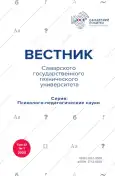The role of neural networks in the development of communicative competence of technical science students
- Authors: Troitskaya Y.V.1
-
Affiliations:
- Samara National Research University named after S.P. Korolev
- Issue: Vol 22, No 1 (2025)
- Pages: 33-44
- Section: Theory and methodology of education
- URL: https://bakhtiniada.ru/1991-8569/article/view/310330
- DOI: https://doi.org/10.17673/vsgtu-pps.2025.1.3
- ID: 310330
Cite item
Full Text
Abstract
Communicative competence has a significant impact on the successful integration of a modern specialist into the professional environment, so its development is one of the priority tasks of educational institutions. At the current stage of modern technological development, AI tools based on neural network models have considerable potential to cope with this task, but for the most effective realization of this potential, it is necessary to create a methodology for their application. This study contributes to the development of the methodology for the application of neural network technologies in the educational process in order to improve the quality of professional training of specialists. The scientific novelty of the work consists in a comprehensive analysis of the effectiveness of applying neural network models to the development of the main components of communicative competence and types of speech activity, taking into account the specific characteristics of students. The following methods were used in the research: content analysis of scientific publications, technical specifications of applications, and reviews of experts and users of software products; pedagogical observation (evaluating how students used neural network technologies in the educational process); online survey (questionnaire) of students to identify their attitude towards the capabilities of AI tools and to collect information on the experience of using neural networks for the development of communicative competence. This research may be of interest to university teachers and researchers dealing with the application of neural network technologies and AI tools. The results of the work can be used in teaching foreign languages at universities to improve the quality of communicative competence development, as well as for the development of educational programs and assessment tools in relevant disciplines.
Full Text
##article.viewOnOriginalSite##About the authors
Yulia V. Troitskaya
Samara National Research University named after S.P. Korolev
Author for correspondence.
Email: troickaya.yuv@ssau.ru
ORCID iD: 0000-0003-4692-6346
Cand. Ped. Sci., Associate Professor at the Department of Foreign Languages and Russian as a Foreign Language
Russian Federation, 34, Moskovskoye shosse, Samara, 443086References
- Wei L. Artificial intelligence in language instruction: Impact on English learning achievement, L2 motivation, and self-regulated learning. Frontiers in Psychology. 2023. Vol. 14. 1261955. DOI: https://doi.org/10.3389/fpsyg.2023.1261955.
- Du J., Daniel B.K. Transforming language education: A systematic review of AI-powered chatbots for English as a foreign language speaking practice. Computers & Education: Artificial Intelligence. 2024. Vol. 6. 100230. DOI: https://doi.org/10.1016/j.caeai.2024.100230.
- Koval’chuk S.V., Taranenko I.A., Ustinova M.B. Primenenie iskusstvennogo intellekta dlya obucheniya inostrannomu yazyku v vuze [Application of AI in language learning at university]. Sovremennye problemy nauki i obrazovaniya. 2023. No. 6. https://science-education.ru/ru/article/view?id=33000 (accessed June 04, 2024).
- Kravcova A.G. ChatGPT-3: Perspektivy ispol’zovaniya v obuchenii inostrannomu yazyku [ChatGPT-3: Perspectives of application to foreign language learning]. Mir nauki, kul’tury, obrazovaniya. 2023. No. 3 (100). Pp. 33–35.
- Malyshev I.O., Smirnov A.A. Obzor sovremennyh generativnyh nejrosetej: otechestvennaya i zarubezhnaya praktika [Overview of modern generative neural networks: domestic and foreign practice]. Mezhdunarodnyj zhurnal gumanitarnyh i estestvennyh nauk. 2024. No. 1–2 (88). Pp. 168–171.
- Kondrahina N.G., Petrova O.N. Ispol’zovanie vozmozhnostej iskusstvennogo intellekta dlya prepodavaniya inostrannyh yazykov: novaya real’nost’ [The use of artificial intelligence power to teach foreign languages: A new reality in education]. Mir nauki, kul’tury, obrazovaniya. 2024. No. 1 (104). Pp. 360–363.
- Kapustina L.V., Ermakova Yu.D., Kalyuzhnaya T.V. ChatGPT i obrazovanie: vechnoe protivostoyanie ili vozmozhnoe sotrudnichestvo? [ChatGPT and education: Eternal confrontation or possible cooperation?]. Nauchno-metodicheskij elektronnyj zhurnal “Koncept”. 2023. No. 10. Pp. 119–132. https://e-koncept.ru/2023/231099.htm (accessed July 06, 2024). doi: 10.24412/2304-120X-2023-11099.
- Hwang G.J., Chang C.Y. A review of opportunities and challenges of chatbots in education. Interactive Learning Environments. 2021. Vol. 31 (7). Pp. 4099–4112. DOI: https://doi.org/10.1080/10494820.2021.1952615.
- Belda-Medina J., Calvo-Ferrer J.R. Using Chatbots as AI Conversational Partners in Language Learning. Applied Sciences. 2022. Vol. 12. 8427. DOI: https://doi.org/10.3390/app12178427.
- Wang F., Cheung A.C.K., Neitzel A.J., Chai C.S. Does Chatting with Chatbots Improve Language Learning Performance? A Meta-Analysis of Chatbot-Assisted Language Learning. Review of Educational Research. 2024. DOI: https://doi.org/10.3102/00346543241255621.
- Oshchepkova N.A., Lugovaya A.V. Vozmozhnosti iskusstvennogo intellekta pri obuchenii inostrannym yazykam [Artificial intelligence possibilities in teaching foreign languages]. Filologicheskij aspekt: mezhdunarodnyj nauchno-prakticheskij zhurnal. 2023. No. 12 (104). https://scipress.ru/philology/articles/vozmozhnosti-iskusstvennogo-intellekta-pri-obuchenii-inostrannym-yazykam.html (accessed July 06, 2024).
- Kuvshinova E.E. Primenenie iskusstvennogo intellekta v obuchenii inostrannomu yazyku [Application of artificial intelligence in foreign language teaching]. Gumanitarij Yuga Rossii. 2024. Vol. 13. No. 2 (66). Pp. 75–84. doi: 10.18522/2227-8656.2024.2.7 (accessed July 06, 2024).
- Zhukov A.D. Generativnyj iskusstvennyj intellekt v obrazovatel’nom processe: vyzovy i perspektivy [Generative artificial intelligence in the educational process: Challenges and prospects]. Vestnik Moskovskogo gosudarstvennogo universiteta kul’tury i iskusstv. 2023. No. 5 (115). Pp. 66–75. https://doi.org/10.24412/1997-0803-2023-5115-66-75 (accessed July 06, 2024).
- Hymes D.H. On Communicative Competence. Sociolinguistics: Selected Readings. Harmondsworth: Penguin, 1972. Pp. 269–293.
- Rickheit G., Strohner H., Vorwerg C. The Concept of Communicative Competence. Handbook of Communication Competence: Handbooks of Applied Linguistics. Berlin, New-York: De Gruyter, 2010. Pp. 15–62. DOI: https://doi.org/10.1515/9783110199000.
- Izarenkov D.I. Bazisnye sostavlyayushchie kommunikativnoj kompetencii i ih formirovanie na prodvinutom etape obucheniya studentov-nefilologov [Basic components of communicative competence and their formation at the advanced level of educating students of non-linguistic departments]. Russkij yazyk za rubezhom. 1990. No. 4. Pp. 54–60.
Supplementary files










